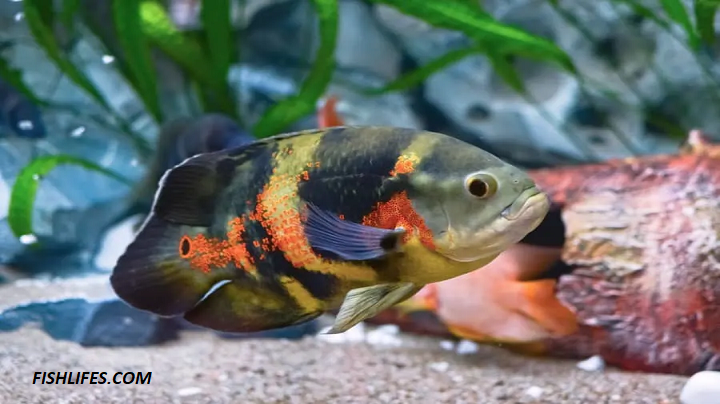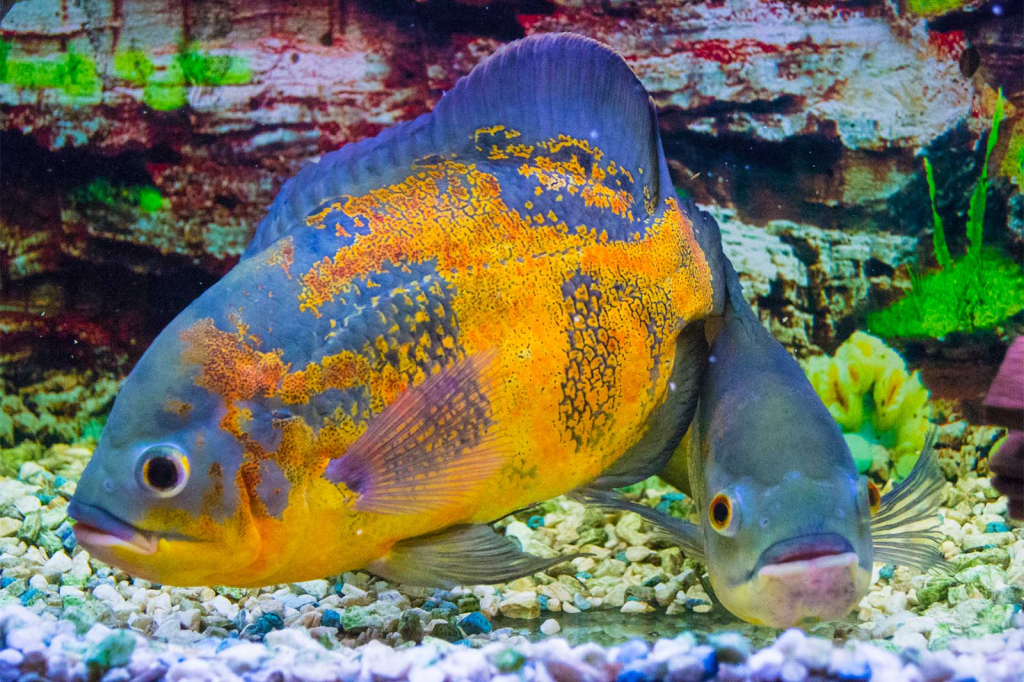Oscar fish are active and colorful aquarium fish that can live for up to 10 years if well-cared for. Unfortunately, there may come a time when an owner notices signs of illness or distress in their pet. Knowing how to recognize these signs is essential for providing proper care and potentially saving the life of an Oscar fish. If you’re seeing signs that your Oscar fish is dying,

It is essential to take action quickly. Knowing the common symptoms of a sick or dying Oscar can help you identify the problem and get your fish’s help before it is too late.
How do I know if my Oscar Fish is Dying?
When owning fish, it can be hard to tell when one is in danger of dying. From behavioral changes to physical signs, many indicators indicate that your oscar fish may be dying. Knowing what to watch for and how to respond can save your pet’s life.
Like any fish, Oscars often exhibit behavior changes before they become ill or die. One sign could be a decrease in activity; for instance, if the oscar usually swims around its tank but suddenly stops moving as much or becomes listless, this could indicate an illness or underlying problem that should not be ignored. Loss of appetite is another principal symptom and should be taken seriously due to its implications of poor health and potentially fatal results if not treated quickly.
Signs my Oscar Fish is Dying.
1. Loss of Appetite
If you have an Oscar fish, you may wonder if your beloved pet is in danger of dying. While it can be hard to tell, some signs could indicate your Oscar fish is ill or close to death. One key sign to look out for is a sudden loss of appetite; if the Oscar fish stops eating its usual amount of food and shows no interest in food, then this could mean that the fish is seriously unwell.
It’s important to identify any changes in behavior as soon as possible and take appropriate action; contact a vet or the specialist aquatic retailer who can help diagnose any underlying issues.
2. Lethargy
One of the most common signs that an Oscar fish is dying is lethargy. This means that the fish may swim slowly or not and may lack interest in food. In addition, Oscar fish are usually quite active and playful, so if your once lively pet stops moving around its tank, it could be a sign of distress.
3. Unusual Coloration
when an oscar suddenly starts exhibiting unusual coloration and behavior, it can be a sign that it is in poor health or even dead. Watch out for some warning signs if you think your oscar may be ill.
Most notably, if your oscar’s colors become faded or grayish instead of their typical bright orange and black stripes, this can signify illness.
4. Hiding
If you own an Oscar fish, it’s normal for it to hide from time to time. However, if your Oscar fish has been hiding drastically more often than usual, this could be a sign that something is wrong and that the fish may be dying.
When healthy and happy, an Oscar fish will show its presence in the tank by swimming around and being active. If your tank’s resident has been hiding in dark or secluded areas of the aquarium without coming out for an extended time, this could indicate that they are ill or on their way out.
5. Erratic Swimming
One of the most common signs that your Oscar Fish is dying is erratic swimming behavior. Erratic swimming often appears as if your fish is struggling to stay afloat in one place or having difficulty controlling its movements.
This could be caused by many things, including a lack of oxygen or an infection in their gills. If you notice Oscar Fish displaying this behavior, it’s important to diagnose what’s wrong and take action quickly before it becomes fatal.
6. Gasping For Air
If your oscar fish begins to gasp for air or appears to be struggling for breath, this could mean several things–from gill damage and parasites to poor water quality or oxygen levels.
Visit a veterinarian as soon as possible to diagnose any potential health issues before they become life-threatening.
7. Frequent Respiratory Rate
Watch for frequent respiratory rate changes to tell if your Oscar is unwell and likely dying. This can signify that your fish’s organs aren’t functioning correctly or struggling with an infection or disease.
When you observe your Oscar, look for rapid fluctuations in their breathing rate. If your fish appears to take more breaths than usual at any given moment, this could cause alarm.
8. Clamped Fins
If you have noticed that your Oscar fish’s fins are clamped, it could mean that something is wrong with your water quality or temperature, both of which can make them stressed and ill. If left untreated, this condition could lead to further health issues such as bacterial infections or parasites, which can ultimately cause death in an Oscar fish.
9. Frayed, Injured Fins
Frayed or injured fins are one of the first warning signs that something is wrong with your Oscar fish. Fins that have become shredded or torn away from the body are a good indication of an underlying issue, such as an infection or injury. This can also be caused by overcrowding in tanks or other aggressive species living with them in the same tank.
10. Lumps or Bumps on the Body
Having an Oscar Fish as a pet can be rewarding, but it can also be heartbreaking when the fish is sick or dying. One of the most common signs of an Oscar Fish dying is if lumps or bumps appear on its body. These lumps and bumps may not appear at first, but they will become more noticeable as the fish’s health deteriorates.
The lumps or bumps on the body of an Oscar Fish could indicate any number of illnesses, so it is important to take your fish to a veterinarian for diagnosis. If left untreated, these lumps and bumps could affect other organs and cause more severe health problems. This can contribute to a quicker demise for your beloved pet fish.
11. White Spots on the Body
This could signify a serious underlying health issue if you have noticed white spots or patches on your Oscar Fish’s body. To ensure your pet fish doesn’t suffer needlessly, it’s important to understand what these white spots may mean and how to address them if they appear.
White spots can indicate various diseases, such as an infection from ichthyophthirius (commonly known as ‘ick’). This parasite is usually contracted through contact with contaminated water and is highly contagious for other fish species. In addition to white spots appearing on the body, other physical changes, such as loss of appetite and lethargy, may also occur.
Reasons for Oscar Fish Dying.
Inadequate Water Quality
Inadequate water quality is one of the most common reasons Oscar fish dies. The water quality in an aquarium is vital to the health and well-being of any species, especially those like Oscar fish, which require specific temperatures and pH levels to thrive. Keeping these parameters within the recommended range is essential for proper maintenance and survival.
The number one factor affecting water quality for Oscar fish is temperature. Too high or too low temperatures can lead to stress, disease, and even death if not appropriately monitored. Other factors, such as pH balance and ammonia levels, must be monitored regularly when caring for Oscar Fish. Suppose these parameters are not maintained at their optimal levels. In that case, it can cause severe stress on the fish, eventually leading to them becoming ill or even dying prematurely.
Inadequate Diet
Proper nutrition is essential for any pet; this includes Oscar fish. An inadequate diet can cause serious health issues that can ultimately lead to death if not addressed in time. To keep your Oscar healthy and happy, you should ensure they eat the right foods regularly throughout the day.
A balanced diet will provide all the nutrients your Oscar needs, such as proteins, fats, carbohydrates, vitamins, and minerals. Also, feed them small portions of food instead of large ones, so they don’t overeat or become bloated with a gas build-up in their swimbladder.

Diseases
One common reason for Oscar fish dying is a disease. Diseases can come in many forms, such as bacterial or parasitic infections, and can be caused by stress or poor water quality. Symptoms may include lethargy, fin damage, or loss of appetite.
If your Oscar fish is exhibiting any of these signs, it’s important to take immediate action to try and prevent the disease from spreading to other fish in the tank. Check your water parameters regularly and keep up with regular partial water changes; keeping the aquarium clean will go a long way in helping keep your Oscars healthy!
How to Save my Oscar Fish From Dying
An oscar fish is a popular pet, but if not taken care of properly, it could die prematurely. To keep your Oscar healthy and happy for years, it’s important to understand how to save them from dying.
Change the Water
It is essential to understand how to change its water to ensure that the oscar fish remains healthy and robust.
Water changes are paramount to the health of an oscar fish as they are sensitive to ammonia levels which can otherwise rise quickly in a tank due to waste particles remaining in the water. When done correctly, changing an oscar’s tank water can be pretty straightforward.
The first step is to check the temperature of both tanks (the one you’re taking from and where you’ll be putting your fish). This will help ensure that your fish acclimatizes correctly and doesn’t suffer from shock when transferred from one body of water to another. Secondly, use a siphon hose or bucket to remove some old tank water into another container for discarding later on.
Clean the Tank
The most important way to keep an oscar fish healthy is by cleaning its tank regularly. This means removing uneaten food and waste from the water and changing 25-30% of the water weekly. Additionally, it’s important to use an aquarium vacuum cleaner to remove excess algae from the bottom of the tank. This will help ensure that your oscar fish has access to clean, oxygenated water at all times.
Test the Water
Testing a tank’s water helps you ensure that all levels are within normal ranges; oxygenation level, pH balance, nitrate levels, and hardness should all be considered when determining whether something is amiss.
You may need additional equipment, such as test strips or a digital reader, to help you read these levels accurately and quickly. These can easily be found at most pet stores or online retailers for relatively cheap prices depending on what type you choose.
Keeping the Water Temperature Stable
The important thing to remember when caring for an oscar fish is maintaining a stable water temperature.
The ideal temperature range for an oscar fish is between 75 and 80 degrees Fahrenheit. To ensure the water temperature stays in this optimal range, invest in an aquarium thermometer and keep an eye on it daily.
Adding air Stone
adding an air stone to aerate the tank can also help keep temperatures consistent and provide additional oxygenation for your oscar fish.
Feed a Healthy Diet
A nutritious diet full of vitamins and minerals will make all the difference in ensuring your fish’s long-term health. From ensuring they’re getting enough proteins to knowing what kind of food they should avoid, here are some tips on saving your Oscar Fish from dying.
When selecting what type of food you should give your Oscar Fish, variety is key. It’s best to provide them with high-quality flakes, pellets, and frozen foods like shrimp, worms, or mussels. While these contain some carbohydrates, they also offer vital nutrients essential for survival, such as omega-3 fatty acids, which help keep their immune system strong.
Provide Hiding Places
Hiding places give your Oscar fish security and a sense of comfort as they explore their environment. This also creates more visual interest and physical cover for them to retreat when feeling threatened or stressed out by other tank mates.
There are several options for providing hiding places for your Oscar fish ranging from small ceramic caves or clay pots placed at different angles in the aquarium gravel to large driftwood pieces with lots of crevices and holes to explore.
Choose Compatible Tank Mates
Compatible tank mates for Oscars must have similar water conditions such as pH levels, temperature, and hardness. Oscars require warmer temperatures than most other freshwater fish, so select species tolerant of higher temperatures.
Additionally, they are aggressive predators, so any potential tank mates should not be small enough to fit in their mouths, as they will likely become dinner! Avoid aggressive or territorial fish like cichlids or bottom dwellers like catfish as they may compete for territory or food, which can stress your Oscar.

How to Prevent Diseases in Oscar Fish?
Every aquarist must know about keeping Oscar fish healthy and free from diseases. To prevent disease in your Oscar Fish, there are several steps you can take.
First, provide them a clean environment by regularly changing their tank water and cleaning the filter system. This will help reduce the number of harmful bacteria in the tank, which could cause illnesses in your fish if left unchecked.
Second, it’s important to feed your Oscar Fish high-quality foods with all the necessary vitamins and minerals for optimum health. Avoid overfeeding them as this can lead to health problems such as obesity or digestive issues.
Related questions
What does a sick Oscar look like?
A sick Oscar will typically lose appetite, have cloudy eyes, have lethargy, and maybe swim erratically. They may also develop white spots or patches on their body. If these symptoms are present, it is essential to consult a veterinarian for diagnosis and treatment.
How can you tell if an Oscar fish is stressed?
Stressed Oscar fish may exhibit behaviors such as darting around the tank, hiding in corners, or not eating. They may also have pale coloration or clamped fins. If you suspect your Oscar is stressed, look for signs of disease and check the water quality to ensure it’s suitable for the fish.
Why is my Oscar sitting at the bottom?
Oscar fish are bottom dwellers, so this is their natural behavior. They hide among plants and rocks at the bottom of the tank. It’s also possible that they are looking for food since this is where most of their prey will be found.
How long will my Oscar live?
The average lifespan of an Oscar fish is 8-10 years, but with proper care and a healthy diet, they can live up to 15 years. To ensure your Oscar has a long and healthy life, regularly clean its water tank, feed it a balanced diet, and provide it with plenty of hiding spots.
Conclusion
In conclusion, an Oscar fish is a long-term pet that can be a fantastic companion for many years with proper care. However, it’s important to recognize the signs of sickness and death in your Oscar so you can take quick action to treat them. Be sure to regularly check your fish for signs of distress, such as loss of appetite, lethargic swimming, clamped fins, or faded colors. If these symptoms appear, take your fish to the vet immediately.
Also Read: Can The Filter Kill My Fish? (Unfortunately, Yes)
